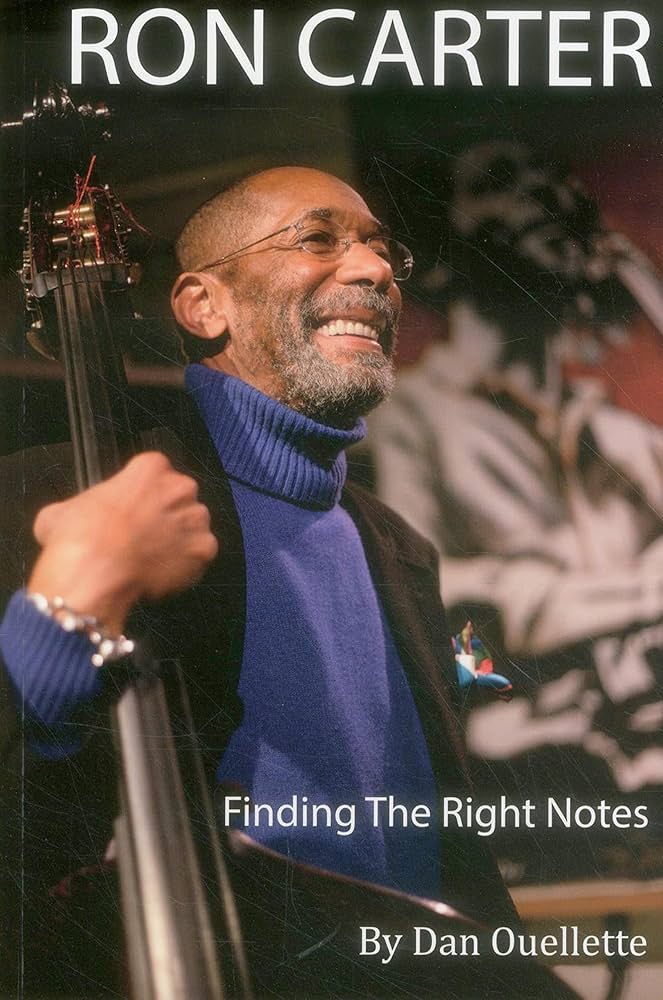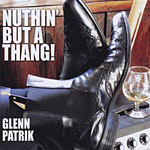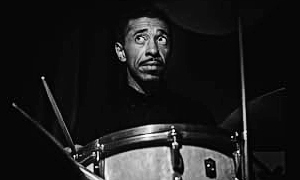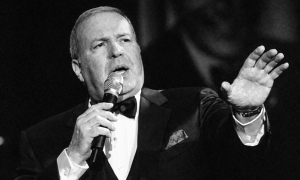Home » Jazz Articles » Book Review » Ron Carter: Finding The Right Notes
Ron Carter: Finding The Right Notes
 Ron Carter: Finding The Right Notes
Ron Carter: Finding The Right Notes Dan Ouellette
435 pages
ISBN: 978-0-615-26526-1
ArtistShare
2008
Songwriter and vocalist Gil Scott-Heron said that his basslines "glowed in the dark." Trumpeter Miles Davis proclaimed him the "anchor" of his groundbreaking quintet of the 1960s. And he literally laid down the groove for the Tribe Called Quest's hip-hop classic, "The Low End Theory."
From 1960 to 2009, whether the music is rock, pop, bop, post-bop, fusion or third stream, you will find one constant presence. A tall, quiet black man, whose bone-thick basslines have provided the foundation for modern music. Whether it was with reed player Eric Dolphy, or as the chief bassist for Creed Taylor's pop-friendly CTI label, Ron Carter is easily the most ubiquitous jazz musician of the last half century, with over 1,000 recordings as a leader and sideman to his credit. But as influential as he is, he is also an enigma. His recent recordings are in the U.S. via a licensing deal with a Japanese company. And like a sphinx, his quiet nature belies an intimidating devotion to the music, and a fierce pride that can be overpowering.
Such a figure would be a challenge for any biographer. Fortunately Dan Ouellette's biography, Ron Carter: Finding the Right Notes is an informative, insightful, and engaging read that unveils all of the complex inventions and dimensions of this important artist. Ouellette, a contributor to Down Beat and former editor at Schwann Spectrum and columnist for Billboard, had unprecedented access to the usually guarded Carter, and he interviewed dozens of musicians including keyboard players Chick Corea, Herbie Hancock and Dr. Billy Taylor, saxophonist Jimmy Heath, hip-hop artist and producer Q-Tip, and bassists Buster Williams, Christian McBride, Charlie Haden and Dave Holland.
What Ouellette reveals is a musician with a firm grasp on his role in the music. The writer's pacing is like that of his subject's playing: steady, with a natural rise and fall befitting of the subject matter. For those familiar with Carter's biography, all of the main parts are detailed: his birth in Ferndale, Michigan, just outside Detroit in 1937 to a solid, middle class family; his schooling in the Motor City's Cass Tech High School, where he changed from cello to bass; his intense studies of European classical music at the Eastman School, where as a student he was stubbed by the conductor Leopold Stokowski; and his dues paying gigs in New York in the 1950s and 1960s.
In this book, Carter opens up as he has never done before, warts and all. His painstaking pursuit of perfection, his never ending battle with critics, his unquestioned role as dean of jazz bassists (juxtaposed with his often tense relationship with the younger McBride), and his love for his deceased college sweetheart wife, are covered with depth and taste. Of course, Carter's role as the vital center in Miles Davis' celebrated combo from 1963 to 1968, is highlighted in detail. Carter proudly describes the group as "a laboratory band. Miles had the lab and the tunes were the chemicals. He allowed us to go in, take our different test tubes and then make our combinations of changes and rhythms. We boiled them up to see if together they had validity."
To say that Carter has played with everybody is an understatement. Time and space do not allow for an even brief overview of the vast array of artists he has worked with: from trumpeter Chet Baker, pianist McCoy Tyner and saxophonist Sonny Rollinsto singers Billy Joel and Diana Ross, vibraphonist Roy Ayers, Jefferson Airplane and composer and pianist Antonio Carlos Jobim. In fact, Carter's feel for Brazilian music was so strong that he became the American musical translator of that country's African-derived genres. Carter's recordings as a leader, from his 1978 hit, Blues Farm (Milestone), to 2007's Dear Miles (Blue Note), are finally given their due.
Other aspects of Carter's life and music are unveiled in this book, including his impressive role of a husband, father, private teacher and college educator. Indeed, Ouellette is to be commended for finally documenting the gargantuan contributions of this gentle giant.
Tags
Ron Carter
Book Reviews
Eugene Holley, Jr.
United States
Gil Scott-Heron
Miles Davis
Eric Dolphy
Creed Taylor
Chick Corea
Herbie Hancock
Billy Taylor
Jimmy Heath
Buster Williams
Christian McBride
Charlie Haden
Dave Holland
Chet Baker
McCoy Tyner
Sonny Rollins
Roy Ayers
Antonio Carlos Jobim
PREVIOUS / NEXT
Ron Carter Concerts
Support All About Jazz
 All About Jazz has been a pillar of jazz since 1995, championing it as an art form and, more importantly, supporting the musicians who make it. Our enduring commitment has made "AAJ" one of the most culturally important websites of its kind, read by hundreds of thousands of fans, musicians and industry figures every month.
All About Jazz has been a pillar of jazz since 1995, championing it as an art form and, more importantly, supporting the musicians who make it. Our enduring commitment has made "AAJ" one of the most culturally important websites of its kind, read by hundreds of thousands of fans, musicians and industry figures every month.
























